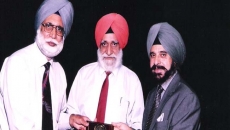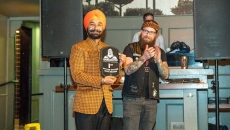Engulfed in the pages of a book are more than a mere collection of words. Books are keepers of our history, carrying within them the energy of all those who have written and read them. Uptaking the pious responsibility of guarding the rich history of the Sikh diaspora, Wanjara Nomad Collections has compiled a bespoke array of antiquities with the purpose of preserving, learning and sharing. The collection features invaluable books, maps, medals, ephemera, albums, swords, and art that traces back to various moments in Sikh history over past centuries.

A reflection of passion, love, and unapologetic righteousness, Wanjara Nomad Collections is the vision of Raj Singh Bhandall. With a hunger to learn, and an unrelenting determination to unearth the past, Bhandall has devotedly put together a collection that can be understood and appreciated in the present. The only known collection of its kind in North America, Bhandall is tirelessly bringing together unmatchable treasures from all over the world under one roof.
The collection is a testament to the desire to preserve, learn and share the history of Sikhism; from inception to present day. “The Sikh diaspora can be seen through “nomads” scattered throughout the world. It is the remembrance of our history that has led these nomads to come together, under one Nishan Sahib”, explains Bhandall.

In line with this thought, Bhandall connected with his close friends, Jessi Dhanju and Sunny Khroud, to collectively bring to light and elucidate the moments in Sikh history that have led us to where we are as people today.

Jessi Dhanju is a human rights lawyer, entrenched in the understanding, and providing of solutions on international legal issues. He is passionate about understanding shifts in geopolitical power and the rise of authoritarianism, and how they are disrupting the dynamics for making progress on human rights globally. The committed community advocate dedicates his time to challenging stigma in the world, and through the Wanjara Nomad Collections, he aims to reconceptualize the Sikh precarity and minoritization globally.
Sunny Khroud is a knowledgeable and passionate historian, who contributes to our shared understanding of how the past has influenced our present, and future. Khroud relentlessly advocates for everyone to preserve, learn and share our shared history of Sikhi. Khroud shares, “Having cataloged the entire collection, the experience has been transformational. There is an abundance of learning and enlightenment waiting to be found under each title.”
Although ownership of these artifacts spans centuries, Wanjara Nomad Collections acts as the curator for this expanding collection. This private collection was created to analyze and transcreate the historical events that have left the Sikh Panth fear ridden of discussing historical atrocities perpetrated against its people. The aim is to inspire the change makers of the world to preserve and care for artifacts in their possession.
The collection features many notable masterpieces and rare discoveries, such as the account of white slave trafficing, which is only now emerging from the archives and the pens of historians. Many written from the perspective of British colonizers, there are also collections of manuals, guides, census records, and reports dating back to the times of the British Empire’s East India Company.
One such book, Proposals for Settling the East India Trade, was printed in 1696. Be it the rare first edition autobiography, Military Memoirs of Mr. George Thomas from 1805, or a book signed by the last emperor of the Sikh Kingdom, Maharaja Duleep Singh, dated June 18, 1856, Bhandall’s flourishing collection contains precious literary gems.

During a time where digital libraries are becoming the norm more so than safeguarding physical literary copies, the Wanjara Nomad Collections is recognizing the need for preservation. Dhanju elaborates, “In a world of instantaneous digital availability, a book has to be uniquely digested using the senses. The feeling of a historical book, aging for centuries is unexplainable. The smell of the pages and the various places they have traveled tantalizes the senses. The appearance of a book, in its physical form, is graceful. The sound of pages turning is intoxicating. A physical book gives readers a more unique and fulfilling reading experience.”
Furthermore, the team highlights that even digital documentation itself is enabled by safeguarding the physical elements of histories. The preservation of a physical book allows for the accurate vetting of digital documents. At the very least, this preservation of books in the physical form allows for authenticity to remain true to its truest form and intention. Digitalization has impacted all facets of art in its various forms. That said, the prevailing truth is that the original is, and always will remain unique.
Upheld by such a noble mindset, the Wanjara Nomad Collections trio is nourishing this one-of-a-kind project with genuine passion, rather than with a monetization angle. With no intentions of profit, the overarching aim is to encourage a ripple effect across generations. Bhandall, Dhanju, and Khroud encourage the younger generations to be open to all channels of communication with their grandparents and parents. The team emphasizes the importance of engaging in this dialogue, asking questions, and absorbing this knowledge. Only then can history be passed onto future generations. Besides inquiring as to what artifacts may be within our own homes, the most important call-to-action is proactive preservation of such artifacts. After all, history will only be forgotten if we allow it to be forgotten.
Although, especially across the Lower Mainland, Punjabi classes in higher education do exist, the focus is often aligned with views that are disengaged from the original concept of Sikhi. Bhandall notes, “History cannot be censored, rather it should be discussed. The Sikh terminology has no such word as censorship. We should acknowledge that, at times, we can be our own worst censor. We need to remove the blinders and be proud to discuss the glorious memories of our ancestors, including but not limited to the Ghallugharas and the Sikh Kingdom.” The holistic message is that too often, a community’s reference points become based entirely in other civilizations. There is a need to understand and appreciate the Sikh Civilization, and the historical reference points therein. This is an arduous battle of decolonizing the past, while ensuring that future thought processes are not recolonized.
To contribute to the cultural, social, and historical fabrics of Sikh history, Wanjara Nomad Collections is moving forward with the dream of setting up a museum as a repository of Sikh Heritage. More importantly, the ultimate goal is to instill the preservation of Sikh history into the conscious, and eventually, the subconscious of all - on an individual level. As the team shares, the future vision is to vow to remember, to be remembered, and for our pulse to remain in the essence and presence of Sri Guru Granth Sahib Ji.
While the collection is not yet accessible to the public, it is currently being compiled on the Wanjara Nomad Collections website, wanjaranomad.com. Meanwhile, working hands are meticulously restoring and preparing the physical pieces for eventual public display. For now, the team encourages the community to get involved by sharing their heirlooms and photos with Wanjara Nomad Collection, and create a part of their own preservation journey. With these efforts and beyond, Wanjara Nomad Collections surely stands in solidarity, with an iron will to authentically preserve history. Extending beyond just air purifiers and book vacuums, Bhandall, Dhanju, and Khroud care for the collection from their hearts. Unified are the shared energies of these individuals and the collection which they heartily continue to grow, truly signifying and beautifully embodying the art and passion of preservation with purpose.






